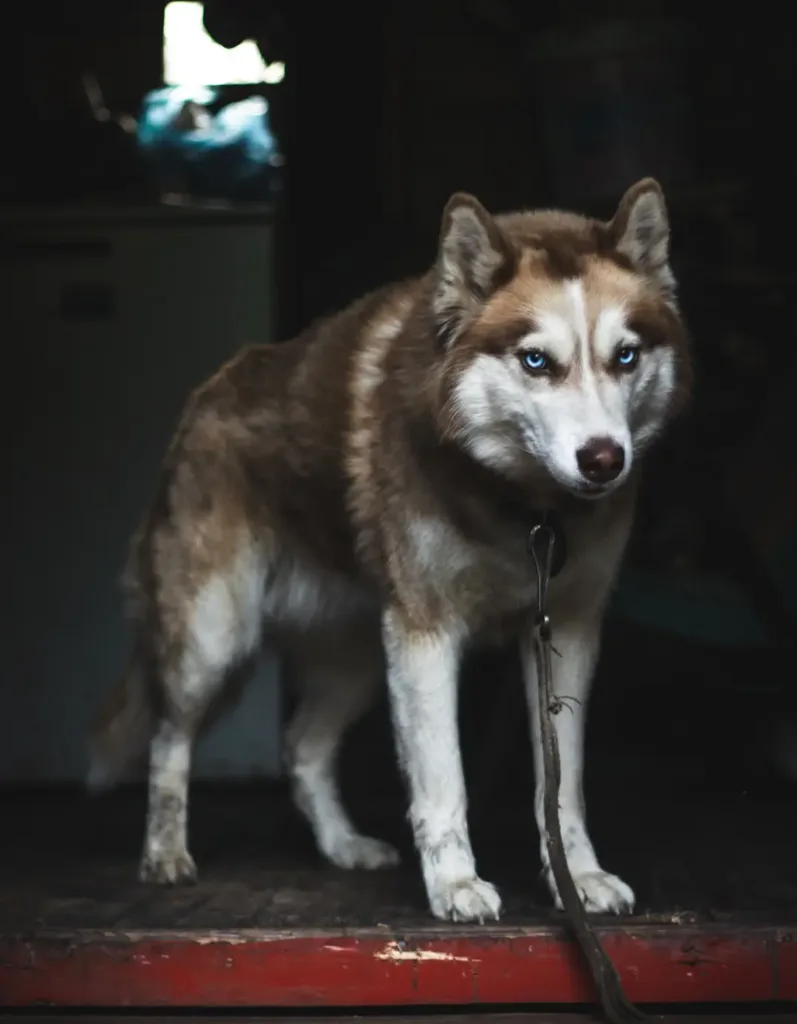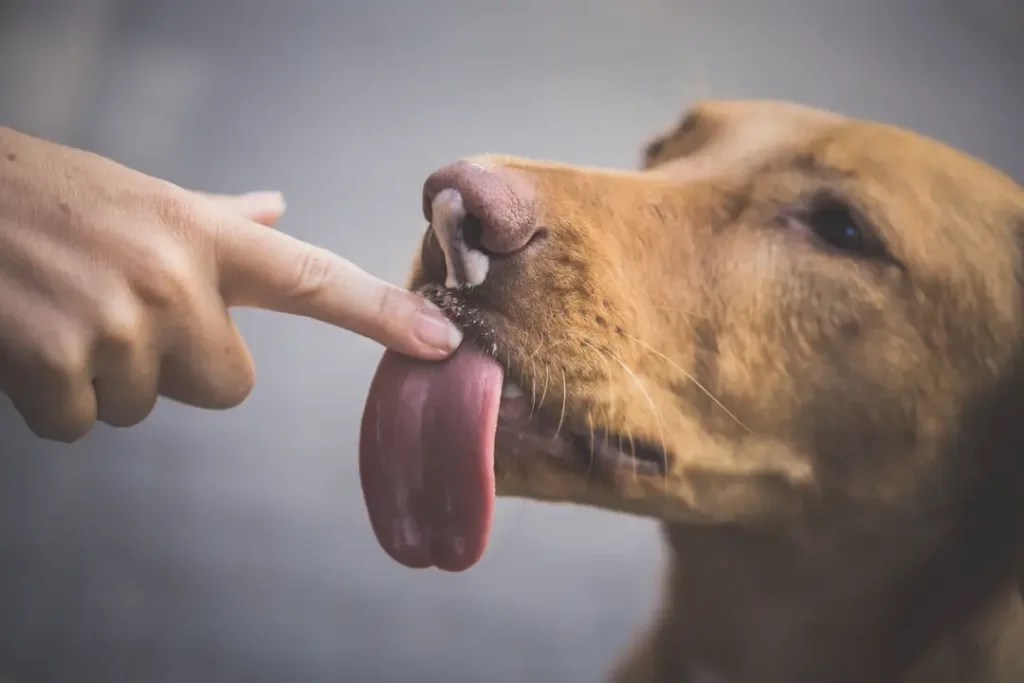If you’re a dog owner, you may have heard the old wives’ tale that dogs can develop a taste for blood. This myth is a cause for concern, especially if you own a larger or more aggressive dog. The question on many owners’ minds is, “If a dog tastes blood, will it attack again?” This is a crucial question to consider, as a dog that develops a taste for blood can pose a serious danger to people and other animals.
In this article, we’ll explore the truth behind this myth and answer the question, “What happens when a dog tastes blood?” We’ll delve into the negative effects that can occur when a dog tastes blood, and explain why it’s important to be aware of these dangers as a dog owner. So, if you want to know the facts about this common misconception, keep reading to discover the 7 shocking negative effects to watch out for when a dog tastes blood.
Table of Contents
The Evolutionary History of Dogs: Understanding the Instinctual Behaviors and Potential Risks of Tasting Blood
To understand what happens when a dog tastes blood, it is important to take a closer look at the evolutionary history of dogs. Dogs are descendants of wolves, which were naturally aggressive animals that would attack when threatened or needed to protect their pack. Over time, domestication has diluted this behavior, but dogs still retain some of the same instinctual behaviors as their ancestors.
One such behavior is natural aggression towards other animals, which can include a taste for blood. However, it is important to note that this behavior does not necessarily mean that a dog will attack again if it tastes blood. Understanding a dog’s predatory instincts and how they have evolved can help put this old wives’ tale into perspective.
That being said, there are still potential negative effects to be aware of if a dog tastes blood. For example, it can lead to increased predatory behavior and a heightened risk of attacking other animals. Additionally, dogs that taste blood may become more possessive or territorial over their food or toys.
By understanding the evolutionary history of dogs and the potential risks associated with tasting blood, dog owners can better understand their pet’s behavior and take steps to prevent any negative consequences. In the following sections, we will explore 7 shocking negative effects that can occur when a dog tastes blood, so keep reading to learn more.
How a Dog's Wild Ancestry Influences Common Behaviors and Instincts
Dogs’ natural instincts and their wild ancestry play a crucial role in their behavior. For instance, aggression and biting are instinctual behaviors that dogs may exhibit when they feel threatened or need to protect their pack.
These behaviors can be dangerous and challenging to control, especially if a dog tastes blood. Other typical behaviors that stem from a dog’s wild roots include howling, digging, and chasing. While these behaviors may be instinctual, proper training and socialization can help dogs control them. Moreover, humans have bred dogs for specific tasks such as herding and hunting.
These tasks can impact a dog’s behavior, and without proper outlets, dogs may struggle to control their urges. It is crucial to understand that a dog’s urge to chase and attack small animals is not necessarily blood lust but rather ingrained behavior. Dogs like Labrador Retrievers, Golden Retrievers, and Weimaraners, may chase small animals that run away from them because of their reflexes.
Understanding a dog’s natural instincts and their breeding can provide a valuable perspective on their behavior. It can also help dog owners recognize potential issues and take the necessary steps to prevent them. With this knowledge, it is possible to help dogs control their aggressive tendencies and avoid negative effects if they taste blood.

If A Dog Tastes Blood, Will It Attack Again?
The term “blooded dog” is often used to describe a dog that has tasted blood, leading people to wonder what happens if a dog tastes blood. Contrary to popular belief, there is no evidence to support the notion that dogs develop a taste for blood. If your dog has licked a cut or wound or even attacked a wild animal, there is no need to worry about it developing a taste for blood that will cause it to attack again.
The aggressive behaviors that dogs display are rooted in their wild ancestry and their breeding, not in their exposure to blood. The blood your dog tastes will not trigger aggressive behavior, nor will it have any impact on their natural instincts. However, if the behavior is not corrected, it may continue, as dogs learn from their owners’ positive or negative reinforcement of their behavior.
Understanding a dog’s natural instincts and how their behavior can be influenced by their environment and training is essential to being a responsible pet owner. Dogs can exhibit a range of behaviors that are instinctual, such as chasing, digging, and howling, but these can be controlled with proper training and socialization.
It’s important to remember that dogs are not bloodthirsty animals, and their behavior is not determined by a single instance of tasting blood. Rather, it is the result of a complex interplay between their genetics, environment, and training. As a pet owner, it is your responsibility to ensure that your dog is trained and socialized properly to prevent any aggressive behaviors that may be harmful to you or others.
The Effect of Eating Blood on Dogs: What You Need to Know
If you’re a dog owner and your furry friend has tasted blood, you may be worried about the possible negative effects. However, the good news is that blood is not toxic to dogs, and a small amount of blood consumption is unlikely to harm them. In fact, blood is rich in iron and other nutrients that can be beneficial to your dog’s health.
If your dog has ingested a large amount of blood, it may cause digestive problems, such as vomiting or diarrhea. In this case, you should monitor your dog’s behavior and contact your veterinarian if the symptoms persist or worsen. Additionally, if your dog frequently tries to eat blood, it may be a sign of an underlying health condition, such as iron deficiency. In this case, it’s important to consult your veterinarian for a proper diagnosis and treatment.
It’s essential to note that while dogs may not develop a taste for blood, they can display aggressive behavior towards other animals. This behavior is rooted in their ancestry and breeding, and it’s essential to train and socialize your dog to control their instincts. Positive reinforcement training can be helpful in preventing aggressive behavior and promoting desirable behavior.
In conclusion, if your dog has tasted blood, there is no need to panic, as it’s not harmful in small quantities. However, if your dog consumes a large amount of blood or shows a persistent interest in it, it’s best to consult your veterinarian to ensure your dog’s overall health and well-being.

Effective Tips for Preventing Aggression in Dogs
Dogs may inherit aggressive behaviors from their wolf ancestors, but careful training and socialization can help prevent aggression from becoming a problem. Here are some tips to help prevent aggression in your dog:
- Avoid punishing your dog for being aggressive as it can worsen the problem.
- Be consistent with your commands and praise to help your dog understand what is expected of them.
- Do not isolate your dog or leave them out of social situations as it can lead to insecurity and fear, which can trigger aggression.
- Ensure your dog receives sufficient exercise to prevent boredom and restlessness which can also lead to aggression.
- Consult a professional trainer or behaviorist immediately if you see signs of aggression such as growling or snapping. They can identify the root of the problem and help you devise a plan to address it.
Creating a calm and happy home environment is also important for preventing dog aggression. Providing your dog with plenty of exercises, affection, and positive reinforcement can help them feel secure and reduce the likelihood of aggressive behavior.
It’s essential to be vigilant of your dog’s behavior and take appropriate action if you notice any signs of aggression. With patience, understanding, and the right training, you can help your dog overcome its aggressive tendencies and enjoy a peaceful and happy life.
Preventing Dog Biting: Effective Measures to Train Your Dog
Dogs have sharp teeth, and if they bite someone, it can cause serious injury and bleeding. Therefore, it is essential to take measures to prevent your dog from biting. The best way to do this is by socializing your dog early and often, which means exposing them to different people, places, and situations to help them become used to them.
If you think your dog might bite, it is important to give a loud and sharp “NO!” to correct their behavior. If your dog does bite and draws blood, it is important to remain calm and not show any fear or anxiety, as dogs can sense our emotions and respond accordingly.
One way to prevent your dog from biting is by using a muzzle, but this is not a long-term solution. Instead, it is best to train your dog not to bite in the first place. Positive reinforcement, such as giving your dog treats or praise when they behave well, is a great way to train them. On the other hand, punishment should be avoided as it can worsen the problem.
If you need help with training your dog not to bite, it is recommended to consult a professional trainer. They have the expertise to respond appropriately and help you train your dog.
In conclusion, preventing your dog from biting is crucial to avoid injury and bleeding. Socializing your dog, using positive reinforcement, and seeking professional help are some ways to stop your dog from biting. Remember to remain calm and avoid punishment to ensure a safe and healthy relationship with your furry friend.

FAQs
There is a common misconception that if a Pitbull tastes blood, they will automatically become aggressive and attack. However, this is not true. Pitbulls are like any other dog breed, and tasting blood will not cause them to become more aggressive.
It is essential to understand that a dog’s behavior is shaped by various factors such as genetics, upbringing, and environment. While some Pitbulls may have a predisposition to aggression due to their breeding history, it is not an inherent trait of the breed.
Pitbulls, like any other dog, can be loving, loyal, and friendly when they are trained, socialized, and treated well. It is crucial to approach each dog as an individual and not generalize based on their breed. Educating ourselves on proper dog training and care can help prevent negative behaviors and promote a healthy and happy relationship with our furry friends, regardless of their breed.
Dogs have an excellent sense of smell, and they can often detect the smell of blood before we can. The taste of blood may appeal to dogs because it is a new and exciting flavor that they are curious about. Moreover, blood is rich in essential nutrients and minerals like iron that dogs need to maintain good health. This may explain why some dogs are attracted to the taste of blood, but it is important to prevent them from consuming too much of it, as it can have negative effects on their health.
When a dog eats a significant amount of blood, it can cause vomiting or diarrhea because blood is not part of their regular diet, and their digestive system is not designed to process it. However, if a dog consumes a small quantity of blood, it is unlikely to cause any problems. It is crucial to keep an eye on your dog’s behavior and watch for any signs of distress or discomfort if they have ingested blood. If you notice any abnormal behavior or symptoms, it is best to consult with a veterinarian to ensure your dog’s health and well-being.
Contrary to popular belief, dogs do not develop a taste for blood. This myth has no scientific basis. Dogs have a different taste bud structure than humans, and their sense of smell is far more potent. While dogs may be drawn to the taste of blood due to its unique flavor, they do not develop a preference for it.
It is essential to ensure that dogs do not consume too much blood, as it can have negative consequences for their health. If you notice any symptoms or abnormal behavior in your dog after consuming blood, it is best to seek the advice of a veterinarian to ensure their well-being.
If you notice your dog licking human blood, it may be because they are trying to show empathy and care. Dogs often lick cuts and wounds to help heal them, and to show that the person is a part of their pack. However, this behavior can also be a sign of excitement, and your dog may start licking without thinking.
It is important to discourage your dog from licking human blood, as their saliva can carry harmful bacteria that can cause infections. If your dog does lick a wound, it is essential to wash it immediately and cover it with a bandage.
So, "What Happens When a Dog Tastes Blood?"
"What Happens When a Dog Tastes Blood?" Don't worry, dogs don't develop a taste for blood and won't become more aggressive if they consume it. Remember, with patience and training, you can help prevent aggressive behaviors in your furry friend.
Dr. Chandrika Tweet
In conclusion, if you’ve ever wondered what happens when a dog tastes blood, you now know the answer. Dogs may be attracted to the taste of blood, but they will not become more aggressive if they consume it. However, it’s important to remember that dogs are complex animals with a long history.
They may display aggressive behavior for various reasons, and it’s essential to handle this behavior with patience and training. If your dog develops aggressive habits and behaviors, it’s important to stay calm and consult with a professional if necessary. With the proper knowledge and approach, you can help your dog overcome behavioral problems.
Additionally, when it comes to dogs and blood, there are a few things to keep in mind. Dogs should not eat large quantities of blood, as it can cause vomiting and diarrhea. Furthermore, you should prevent your dog from licking blood, as their saliva can carry harmful bacteria that cause infections. Overall, it’s important to be aware of the negative effects of a dog tasting blood and take the necessary steps to ensure your dog’s health and well-being.


